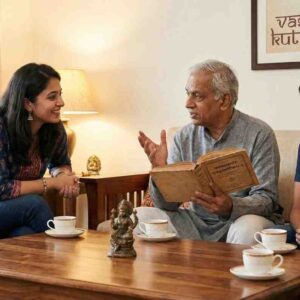In an educational landscape historically dominated by rote memorization, Indian classrooms are at a crossroads, with growing calls for a shift towards more innovative and understanding-based learning methods. The age-old practice of ‘mugging up’—memorizing information without understanding—is being questioned for its relevance and effectiveness in today’s dynamic world.
Shifting Educational Paradigms
The Roots of Rote Learning
- Traditionally, Indian education has heavily emphasized rote learning, especially in preparation for high-stakes tests like board exams and competitive entrance exams for professional courses. According to a study by the National Institute of Educational Planning and Administration, over 60% of Indian students rely primarily on memorization to prepare for exams.
Calls for Reform
- The introduction of the National Education Policy (NEP) 2020 marks a significant policy shift, advocating for a move away from rote learning to promote critical thinking and problem-solving skills. The NEP proposes an education system that encourages students to understand concepts rather than merely recall facts.
Impact on Student Engagement and Success
Enhancing Cognitive Skills
- Research indicates that understanding-based learning fosters deeper cognitive development and equips students with the skills necessary to navigate complex problems. A report by the Education Ministry suggests that schools implementing interactive and exploratory learning methods have seen a 40% improvement in students’ problem-solving abilities.
Challenges in Implementation
- Despite the push for change, many schools struggle to move away from rote techniques, partly due to large class sizes and inadequate teacher training. Effective implementation requires significant changes in teaching methods, assessment techniques, and curriculum design.
The Debate Continues
Supporters of Traditional Methods
- Some educators and parents argue that rote learning has a place in education, particularly in early learning phases where basic facts and formulas need to be memorized. They contend that a balanced approach that includes memorization, along with conceptual learning, might be more effective.
The Case for Innovative Learning
- Critics of rote learning argue that it stifles creativity and analytical thinking—skills that are crucial in today’s global economy. They advocate for a complete overhaul of the current system to cultivate original thinking and adaptability among students.
Looking Ahead: A New Direction for Indian Education
Government and Educational Leaders’ Role
- For this educational shift to be successful, ongoing support from government policies, including funding for teacher training and curriculum development, is critical. The NEP 2020 lays down a framework for these changes, but the effectiveness will depend on robust implementation and continuous evaluation.
Community and Cultural Shifts
- Changing the deeply ingrained culture of rote learning requires not just policy changes but also a shift in societal attitudes towards education. Parents, educators, and the community at large need to value and reinforce the benefits of understanding-based learning.
Conclusion
As India stands on the brink of educational reform, the move away from rote learning toward a more holistic educational experience could very well determine the future competitiveness and innovativeness of its next generation. While the transition challenges are significant, the potential to transform Indian classrooms into thriving environments for comprehensive learning holds the promise of profound national benefits. The journey from ‘mugging up’ to meaningful learning is not just a change in teaching techniques; it’s an evolution towards nurturing a smarter, more capable future workforce.












